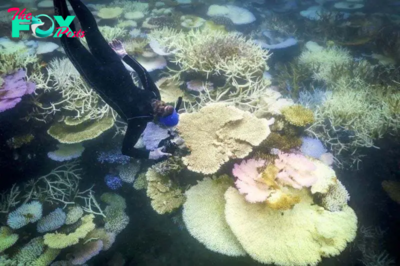Technology
Japan's $26 billion deep sea discovery sparks serious environmental concerns | The Express Tribune
Japan's recent deep-sea discovery, estimated to be worth over $26 billion, is generating significant concern over its environmental consequences. An expert has warned that while the find may bring economic benefits, it could also cause devastating harm to ocean life.
A collaborative survey by The Nippon Foundation and the University of Tokyo has revealed a dense field of manganese nodules on the seabed near Minami-Tori-shima Island, about 1,200 miles southeast of Tokyo. These nodules, located some 5,700 meters below sea level, are rich in cobalt and nickel—two essential components in the production of electric vehicle (EV) batteries.
The discovery contains an estimated 610,000 metric tons of cobalt and 740,000 metric tons of nickel, worth a staggering $26.29 billion at current market rates. Cobalt is valued at $24,300 per metric ton, and nickel is priced at $15,497 per ton, according to Trading Economics. Japan's find includes $14.82 billion worth of cobalt and $11.47 billion worth of nickel.
However, while the financial gains are significant, the environmental implications are troubling. A study led by Travis Washburn, a researcher at the Geological Survey of Japan, highlights the destructive effects of deep-sea mining on marine ecosystems. The study shows that mining operations lead to the disappearance of marine life from both the immediate area and surrounding regions.
“These results suggest the impact of deep-sea mining could be even bigger than we think,” Washburn stated. The study found a dramatic 43% decrease in fish and shrimp populations one year after the mining test was conducted. Washburn had initially anticipated minimal impact, given the small scale of the test—only two hours of machine operation, with sediment plumes drifting just a few hundred meters. "But it was actually enough to shift things," he explained.
Washburn noted that the process of extraction itself would not be simple, and described this as a crucial test case for weighing the benefits of deep-sea mining against the potential ecological costs. “We see this as a potential test case for the benefits versus disadvantages of deep-sea mining of materials relating to the global fuel to materials transition,” he said.
Sophie Benbow, director of the marine programme at a conservation charity, warned of the potentially irreversible losses to ocean biodiversity. "There is so much we could learn from ocean biodiversity. Medical advances and new technologies could be deciphered from the study of deep-sea species, but they could be wiped out before we even know they exist if deep-seabed mining is to go ahead prematurely," she told the BBC.
As Japan moves forward with its deep-sea mining project, the balance between economic gain and environmental protection remains a key point of contention. The long-term consequences for ocean life are still unfolding.
-

 Technology3h ago
Technology3h agoShould I worry about mold growing in my home?
-

 Technology3h ago
Technology3h agoBlurry, morphing and surreal – a new AI aesthetic is emerging in film
-

 Technology1d ago
Technology1d agoRethinking screen time: A better understanding of what people do on their devices is key to digital well-being
-

 Technology1d ago
Technology1d agoAn 83-year-old short story by Borges portends a bleak future for the internet
-

 Technology2d ago
Technology2d agoFrom using plant rinds to high-tech materials, bike helmets have improved significantly over the past 2 centuries
-

 Technology2d ago
Technology2d agoWhy do I feel better when I wake myself up instead of relying on an alarm? A neurologist explains the science of a restful night’s sleep
-

 Technology3d ago
Technology3d agoBluesky’s rise: why users are migrating from X? | The Express Tribune
-

 Technology4d ago
Technology4d agoNorth Pole shift towards Russia alarms scientists, potentially disrupting smartphone accuracy | The Express Tribune



























